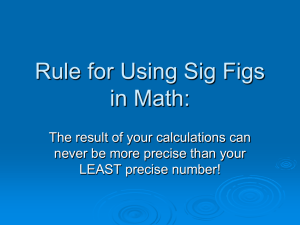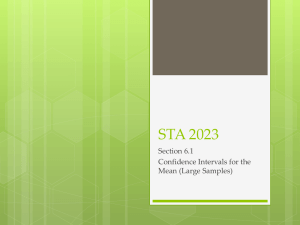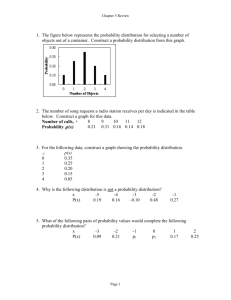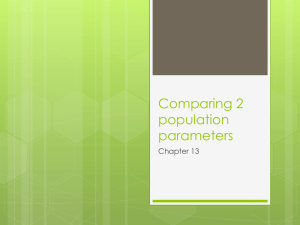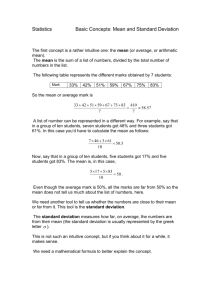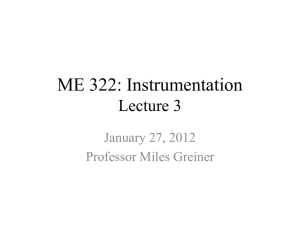ch06
advertisement
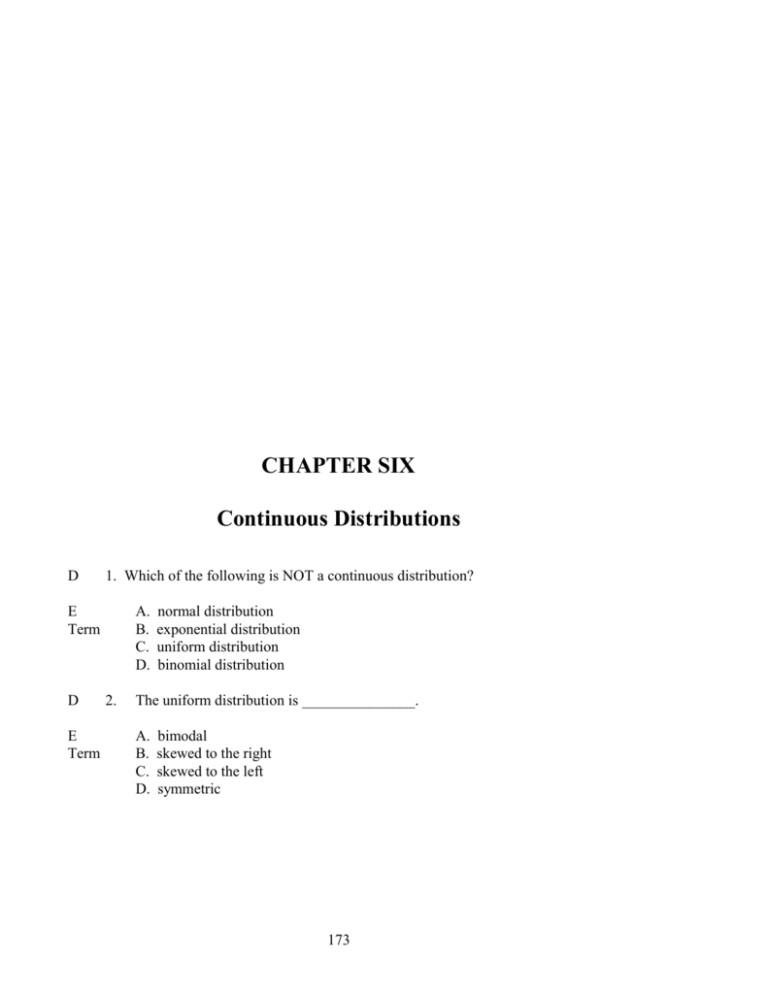
CHAPTER SIX Continuous Distributions D 1. Which of the following is NOT a continuous distribution? E Term D E Term A. B. C. D. 2. normal distribution exponential distribution uniform distribution binomial distribution The uniform distribution is _______________. A. B. C. D. bimodal skewed to the right skewed to the left symmetric 173 174 Test Bank A 3. E Term A. B. C. D. 4. rectangular distribution gamma distribution beta distribution Erlang distribution The distribution in the following graph is a ________ distribution. f(X) D The uniform distribution is also known as the __________. 0.06 0.05 0.04 0.03 0.02 0.01 0.00 35 E Term A E Term A. B. C. D. 5. 40 45 50 55 60 x 65 normal gamma exponential uniform The distribution in the following graph is a ________ distribution. A. B. C. D. normal gamma exponential uniform Chapter 6: Continuous Distributions 175 C 6. E Term B A. B. C. D. 7. E Term A 8. M Calc 1/8 1/4 1/12 1/20 If X is uniformly distributed over the interval 8 to 12, inclusively (8 X 12), then the mean() of this distribution is __________________. A. B. C. D. 9. normal gamma exponential uniform If X is uniformly distributed over the interval 8 to 12, inclusively (8 X 12), then the height of this distribution, f(x), is __________________. A. B. C. D. M Calc C The distribution in the following graph is a ________ distribution. 10 20 5 incalculable If X is uniformly distributed over the interval 8 to 12, inclusively (8 X 12), then the standard deviation () of this distribution is __________________. A. B. C. D. 4 1.33 1.15 2 176 Test Bank B 10. M Calc C A. B. C. D. 11. M Calc D 12. M Calc A M Calc 0.250 0.500 0.375 0.000 If X is uniformly distributed over the interval 8 to 12, inclusively (8 X 12), then P(X < 7) is __________________. A. B. C. D. 14. 0.250 0.333 0.375 0.000 If X is uniformly distributed over the interval 8 to 12, inclusively (8 X 12), then the P(13 X 15) is __________________. A. B. C. D. 13. 0.250 0.500 0.333 1.000 If X is uniformly distributed over the interval 8 to 12, inclusively (8 X 12), then the P(10.0 X 11.5) is __________________. A. B. C. D. M Calc B If X is uniformly distributed over the interval 8 to 12, inclusively (8 X 12), then the P(9 X 11) is __________________. 0.500 0.000 0.375 0.250 If X is uniformly distributed over the interval 8 to 12, inclusively (8 X 12), then P(X 11) is __________________. A. B. C. D. 0.750 0.000 0.333 0.500 Chapter 6: Continuous Distributions 177 D 15. E Calc A A. B. C. D. 16. E Calc B 17. M Calc C M Calc 50 25 10 5 If X is uniformly distributed over the interval 20 to 30, inclusively (20 X 30), then the standard deviation () of this distribution is __________________. A. B. C. D. 19. 1/10 1/20 1/30 1/50 If X is uniformly distributed over the interval 20 to 30, inclusively (20 X 30), then the mean () of this distribution is __________________. A. B. C. D. 18. 0.750 0.000 0.333 0.500 If X is uniformly distributed over the interval 20 to 30, inclusively (20 X 30), then the height of this distribution, f(x), is __________________. A. B. C. D. M Calc D If X is uniformly distributed over the interval 8 to 12, inclusively (8 X 12), then P(X 10) is __________________. incalculable 8.33 0.833 2.89 If X is uniformly distributed over the interval 20 to 30, inclusively (20 X 30), then P(25 X 28) is __________________. A. B. C. D. 0.250 0.500 0.300 1.000 178 Test Bank A 20. M Calc B A. B. C. D. 21. M Calc C 22. M Calc D M Calc 0.500 0.300 0.000 0.250 If X is uniformly distributed over the interval 20 to 30, inclusively (20 X 30), then P(X 22) is __________________. A. B. C. D. 24. 0.500 0.000 0.375 0.200 If X is uniformly distributed over the interval 20 to 30, inclusively (20 X 30), then P(X < 17) is __________________. A. B. C. D. 23. 0.250 0.333 0.375 0.000 If X is uniformly distributed over the interval 20 to 30, inclusively (20 X 30), then P(33 X 35) is __________________. A. B. C. D. M Calc A If X is uniformly distributed over the interval 20 to 30, inclusively (20 X 30), then P(21.75 X 24.25) is __________________. 0.200 0.300 0.000 0.250 If X is uniformly distributed over the interval 20 to 30, inclusively (20 X 30), then P(X 24) is __________________. A. B. C. D. 0.100 0.000 0.333 0.600 Chapter 6: Continuous Distributions 179 C 25. Helen Casner, a labor relations arbitrator, feels that the amount of time needed to arbitrate a labor dispute is uniformly distributed over the interval 4 to 24 hours, inclusively (4 X 24). Accordingly, the mean (average) time needed to arbitrate a labor dispute is ____________. M BCalc A. B. C. D. D Helen Casner, a labor relations arbitrator, feels that the amount of time needed to arbitrate a labor dispute is uniformly distributed over the interval 4 to 24 hours, inclusively (4 X 24). Accordingly, the probability that a labor dispute will be arbitrated in 8 hours or less is ____________. 26. 20 hours 16 hours 14 hours 12 hours M BCalc A. B. C. D. C Helen Casner, a labor relations arbitrator, feels that the amount of time needed to arbitrate a labor dispute is uniformly distributed over the interval 4 to 24 hours, inclusively (4 X 24). Accordingly, the probability that a labor dispute will require between 8 and 16 hours, inclusively, for arbitration is ____________. 27. 0.3333 0.6667 0.0000 0.2000 M BCalc A. B. C. D. B The normal distribution is an example of _______. 28. E Term A. B. C. D. 0.3333 0.6667 0.4000 0.2000 a discrete distribution a continuous distribution a bimodal distribution an exponential distribution 180 Test Bank B 29. The total area underneath any normal curve is _______. E Term A. B. C. D. D The area to the left of the mean in any normal distribution is _______. 30. equal to the mean equal to 1 equal to the variance equal to the coefficient of variation E Term A. B. C. D. B For any normal distribution, any value less than the mean would have a _______. 31. equal to the mean equal to 1 equal to the variance equal to 0.5 E Term A. B. C. D. D A standardized normal distribution has the following characteristics: 32. positive Z-score negative Z-score negative variance negative probability of occurring E Term A. B. C. D. C If X is a normal random variable with mean 80 and standard deviation 5, calculate the Z score if X=88. 33. E Calc D E Calc A. B. C. D. 34. the mean and variance are both equal to 1 the mean and variance are both equal to 0 the mean is equal to the variance the mean is equal to 0 and the variance is equal to 1 1.8 -1.8 1.6 -1.6 If X is a normal random variable with mean 80 and standard deviation 5, calculate the Z score if X=72. A. B. C. D. 1.8 -1.8 1.6 -1.6 Chapter 6: Continuous Distributions 181 D 35. E Calc C A. B. C. D. 36. E Calc C 37. M Calc B E Calc 63.4 56.6 66.8 53.2 Suppose X is a normal random variable with mean 60 and standard deviation 2. A Z score was calculated for a number, and the Z score is -1.3. What is X? A. B. C. D. 39. 1.5 2.5 -1.5 -2.5 Suppose X is a normal random variable with mean 60 and standard deviation 2. A Z score was calculated for a number, and the Z score is 3.4. What is X? A. B. C. D. 38. 2.1 12 1.2 2.4 If X is a normal random variable with mean 60 and standard deviation 2, calculate the Z score if X=57. A. B. C. D. M Calc D If X is a normal random variable with mean 80 and standard deviation 5, calculate the Z score if X=92. 58.7 61.3 62.6 57.4 Let Z be a normal random variable with mean 0 and standard deviation 1. Use the normal tables to find P(Z < 1.3). A. B. C. D. 0.4032 0.9032 0.0968 0.3485 182 Test Bank D 40. E Calc C A. B. C. D. 41. M Calc D 42. M Calc C M Calc 0.4821 -0.4821 0.9821 0.0179 Let Z be a normal random variable with mean 0 and standard deviation 1. Use the normal tables to find P(Z > -1.1). A. B. C. D. 44. 0.4918 0.9918 0.0082 0.4793 Let Z be a normal random variable with mean 0 and standard deviation 1. Use the normal tables to find P(Z < -2.1). A. B. C. D. 43. 0.4032 0.9032 0.4893 0.0861 Let Z be a normal random variable with mean 0 and standard deviation 1. Use the normal tables to find P(Z > 2.4). A. B. C. D. M Calc B Let Z be a normal random variable with mean 0 and standard deviation 1. Use the normal tables to find P(1.3 < Z < 2.3). 0.3643 0.8643 0.1357 -0.1357 Let Z be a normal random variable with mean 0 and standard deviation 1. Use the normal tables to find P(-2.25 < Z < -1.1). A. B. C. D. 0.3643 0.8643 0.1235 0.4878 Chapter 6: Continuous Distributions 183 B 45. M Calc C A. B. C. D. 46. E Calc A 47. M Calc A M Calc 0.670 -1.254 0.000 1.280 Let Z be a normal random variable with mean 0 and standard deviation 1. The 90th percentile of Z is ____________. A. B. C. D. 49. 0.670 -1.254 0.000 1.280 Let Z be a normal random variable with mean 0 and standard deviation 1. The 75th percentile of Z is ____________. A. B. C. D. 48. 0.3643 0.8521 0.1235 0.4878 Let Z be a normal random variable with mean 0 and standard deviation 1. The 50th percentile of Z is ____________. A. B. C. D. M Calc D Let Z be a normal random variable with mean 0 and standard deviation 1. Use the normal tables to find P(-2.25 < Z < 1.1). 1.645 -1.254 1.960 1.280 Let Z be a normal random variable with mean 0 and standard deviation 1. The 95th percentile of Z is ____________. A. B. C. D. 1.645 -1.254 1.960 1.280 184 Test Bank B 50. M Calc C A. B. C. D. 51. M Calc B 52. M Calc B E Calc 0.0987 0.4013 -0.0987 0.5987 Let X be a normal random variable with mean 20 and standard deviation 4. Find P(16 < X < 22). A. B. C. D. 54. 0.2734 0.7734 0.2266 -0.2734 Let X be a normal random variable with mean 20 and standard deviation 4. Find P(X < 19). A. B. C. D. 53. 0.3944 0.8944 0.1056 0.6056 Let X be a normal random variable with mean 20 and standard deviation 4. Find P(X < 17). A. B. C. D. M Calc D Let X be a normal random variable with mean 20 and standard deviation 4. Find P(X < 25). 0.4672 0.0328 0.1498 0.5328 Let X be a normal random variable with mean 20 and standard deviation 4. The 50th percentile of X is ____________. A. B. C. D. 4.000 20.000 22.698 26.579 Chapter 6: Continuous Distributions 185 C 55. M Calc A A. B. C. D. 56. M Calc D 57. M Calc A M Calc 25.126 20.000 22.698 26.579 Let X be a normal random variable with mean 40 and standard deviation 8. Find P(32 < X < 44). A. B. C. D. 59. 25.126 20.000 22.698 26.579 Let X be a normal random variable with mean 20 and standard deviation 4. The 95th percentile of X is ____________. A. B. C. D. 58. 25.126 20.000 22.698 26.579 Let X be a normal random variable with mean 20 and standard deviation 4. The 90th percentile of X is ____________. A. B. C. D. M Calc D Let X be a normal random variable with mean 20 and standard deviation 4. The 75th percentile of X is ____________. 0.4672 0.0328 0.1498 0.5328 Let X be a normal random variable with mean 40 and standard deviation 8. Find P(X < 96). A. B. C. D. 1.0000 0.0000 0.0793 0.0575 186 Test Bank B 60. M Calc B Let X be a normal random variable with mean 40 and standard deviation 2. Find P(X < 28). A. B. C. D. 61. 1.0000 0.0000 0.2580 0.0472 A Z score is the number of __________ that a value is from the mean. E Term A. B. C. D. C Within a range of Z scores from -1 to +1, you can expect to find _______ per cent of the values in a normal distribution. 62. variances standard deviations units miles E Term A. B. C. D. A Within a range of Z scores from -2 to +2, you can expect to find _______ per cent of the values in a normal distribution. 63. 95 99 68 34 E Term A. B. C. D. C The expected (mean) life of a particular type of light bulb is 1,000 hours with a standard deviation of 50 hours. The life of this bulb is normally distributed. What is the probability that a randomly selected bulb would last longer than 1150 hours? M Calc 64. A. B. C. D. 95 99 68 34 0.4987 0.9987 0.0013 0.5013 Chapter 6: Continuous Distributions 187 B 65. M Calc C A. B. C. D. 66. M Calc D 67. H Calc 0.3849 0.8849 0.1151 0.6151 Suppose you are working with a data set that is normally distributed with a mean of 400 and a standard deviation of 20. Determine the value of X such that 60% of the values are greater than X. A. B. C. D. 68. 0.4772 0.9772 0.0228 0.5228 The expected (mean) life of a particular type of light bulb is 1,000 hours with a standard deviation of 50 hours. The life of this bulb is normally distributed. What is the probability that a randomly selected bulb would last fewer than 940 hours? A. B. C. D. H Calc A The expected (mean) life of a particular type of light bulb is 1,000 hours with a standard deviation of 50 hours. The life of this bulb is normally distributed. What is the probability that a randomly selected bulb would last fewer than 1100 hours? 404.5 395.5 405.0 395.0 Suppose you are working with a data set that is normally distributed with a mean of 400 and a standard deviation of 20. Determine the value of X such that only 1% of the values are greater than X. A. B. C. D. 446.6 353.4 400.039 405 188 Test Bank C 69. H Calc C A. B. C. D. 70. M Calc B 71. H Calc 0.3944 0.8944 0.1056 0.6056 The E.P.A. has reported that the average fuel cost for a particular type of automobile is $800 with a standard deviation of $80. Fuel cost is assumed to be normally distributed. If one of these cars is randomly selected, what is the probability that the fuel cost for this car exceeds $760? A. B. C. D. 72. 432.9 396 367.1 404 The E.P.A. has reported that the average fuel cost for a particular type of automobile is $800 with a standard deviation of $80. Fuel cost is assumed to be normally distributed. If one of these cars is randomly selected, what is the probability that the fuel cost for this car exceeds $900? A. B. C. D. M Calc B Suppose you are working with a data set that is normally distributed with a mean of 400 and a standard deviation of 20. Determine the value of X such that 5% of the values are less than X. 0.1915 0.6915 0.3085 0.8085 The E.P.A. has reported that the average fuel cost for a particular type of automobile is $800 with a standard deviation of $80. Fuel cost is assumed to be normally distributed. We would expect that only 10% of these cars would have an annual fuel cost greater than _______. A. B. C. D. 820.0 902.4 808.0 812.8 Chapter 6: Continuous Distributions 189 A 73. M Calc C The E.P.A. has reported that the average fuel cost for a particular type of automobile is $800 with a standard deviation of $80. Fuel cost is assumed to be normally distributed. If a car is randomly selected, what is the probability that fuel cost would be between $700 and $900? A. B. C. D. 74. 0.7888 0.8944 0.3944 0.1056 The net profit of an investment is normally distributed with a mean of $10,000 and a standard deviation of $5,000. The probability that the investor will not have a net loss is _____________. M BCalc A. B. C. D. B The net profit of an investment is normally distributed with a mean of $10,000 and a standard deviation of $5,000. The probability that the investor will have a net loss is _____________. 75. 0.4772 0.0228 0.9772 0.9544 M BCalc A. B. C. D. A The net profit of an investment is normally distributed with a mean of $10,000 and a standard deviation of $5,000. The probability that the investor’s net profit will be between $12,000 and $15,000 is _____________. 76. M BCalc A. B. C. D. 0.4772 0.0228 0.9772 0.9544 0.1859 0.3413 0.8413 0.4967 190 Test Bank C 77. The net profit of an investment is normally distributed with a mean of $10,000 and a standard deviation of $5,000. The probability that the investor’s net gain will be at least $5,000 is _____________. M BCalc A. B. C. D. A Completion time (from start to finish) of a building remodeling project is normally distributed with a mean of 200 work-days and a standard deviation of 10 work-days. The probability that the project will be completed within 185 workdays is ______. 78. 0.1859 0.3413 0.8413 0.4967 M BCalc A. B. C. D. D Completion time (from start to finish) of a building remodeling project is normally distributed with a mean of 200 work-days and a standard deviation of 10 work-days. The probability that the project will be completed within 215 workdays is _____. 79. 0.0668 0.4332 0.5000 0.9332 M BCalc A. B. C. D. A Completion time (from start to finish) of a building remodeling project is normally distributed with a mean of 200 work-days and a standard deviation of 10 work-days. The probability that the project will not be completed within 215 work-days is _____. 80. M BCalc A. B. C. D. 0.0668 0.4332 0.5000 0.9332 0.0668 0.4332 0.5000 0.9332 Chapter 6: Continuous Distributions 191 C 81. Completion time (from start to finish) of a building remodeling project is normally distributed with a mean of 200 work-days and a standard deviation of 10 work-days. The probability that the project will be completed within ____ workdays is 0.99. M BCalc A. B. C. D. B The length of steel rods produced by a shearing process are normally distributed with = 120 inches and = 0.05 inch. Industry standards require the rods to be between 119.90 and 120.15 inches, inclusively. The probability that a rod produced by this process will conform to industry standards is ______________. 82. 211 187 223 200 M BCalc A. B. C. D. C The length of steel rods produced by a shearing process are normally distributed with = 120 inches and = 0.05 inch. Industry standards require the rods to be between 119.90 and 120.15 inches, inclusively. Any rod longer than 120.15 inches is re-sheared. The probability that a rod produced by this process will require re-shearing is ___________. 83. 0.9542 0.9759 0.9974 0.6826 M BCalc A. B. C. D. B The length of steel rods produced by a shearing process are normally distributed with = 120 inches and = 0.05 inch. Industry standards require the rods to be between 119.90 and 120.15 inches, inclusively. Any rod shorter than 119.90 inches is scrapped (used in the next melt). The probability that a rod produced by this process will be scrapped is ___________. 84. M BCalc A. B. C. D. 0.0458 0.0228 0.0013 0.0241 0.0458 0.0228 0.0013 0.0241 192 Test Bank A 85. The weights of aluminum castings produced by a process are normally distributed with = 2 pounds and = 0.10 pound. Design specifications require the castings to weigh between 1.836 and 2.164 pounds, inclusively. The probability that a casting produced by this process will conform to design specifications is _________. M BCalc A. B. C. D. C The weights of aluminum castings produced by a process are normally distributed with = 2 pounds and = 0.10 pound. Design specifications require the castings to weigh between 1.836 and 2.164 pounds, inclusively. Any casting weighing less than 1.836 pounds is scrapped. The probability that a casting produced by this process will be scrapped, due to under-weight, is _________. 86. 0.8990 0.4495 0.9974 0.9500 M BCalc A. B. C. D. C The weights of aluminum castings produced by a process are normally distributed with = 2 pounds and = 0.10 pound. Design specifications require the castings to weigh between 1.836 and 2.164 pounds, inclusively. Any casting weighing more than 2.164 pounds is re-worked. The probability that a casting produced by this process will be re-worked, due to over-weight, is _________. 87. 0.1010 0.4495 0.0505 0.0010 M BCalc A. B. C. D. B Let X be a binomial random variable with n=20 and p=.8. If we use the normal distribution to approximate probabilities for this, we would use a mean of _______. E Calc 88. A. B. C. D. 0.0010 0.1010 0.0101 0.0505 20 16 3.2 8 Chapter 6: Continuous Distributions 193 C 89. M Calc B Let X be a binomial random variable with n=20 and p=.8. If we use the normal distribution to approximate probabilities for this, we would use a standard deviation of _______. A. B. C. D. 90. 16 3.2 1.79 0.16 Let X be a binomial random variable with n=20 and p=.8. If we use the normal distribution to approximate probabilities for this, a correction for continuity should be made. To find the probability of more than 12 successes, we should find _______. M Term A. B. C. D. B Let X be a binomial random variable with n=20 and p=.8. If we use the normal distribution to approximate probabilities for this, a correction for continuity should be made. To find the probability of 12 successes or more, we should find _______. 91. P(X>12) P(X>12.5) P(X>11.5) P(X<11.5) M Term A. B. C. D. C Let X be a binomial random variable with n=20 and p=.8. If we use the normal distribution to approximate probabilities for this, a correction for continuity should be made. To find the probability of more than 6 but less than 12 successes, we should find _______. H Calc 92. A. B. C. D. P(X>12) P(X>11.5) P(X>12.5) P(X<12.5) P(6<X<12) P(6.5<X<12.5) P(6.5<X<11.5) P(5.5<X<12.5) 194 Test Bank C 93. Ten percent of all personal loans granted by First Easy Money Bank are defaulted in the fourth re-payment month. One-hundred four-month old personal loans are randomly selected from a population of 3,000. The number of defaulted loans in this sample has a binomial distribution. If we use the normal distribution to approximate probabilities for this, we would use a mean of _______. M BCalc A. B. C. D. B According to the U. S. Department of Commerce, 8.6% of the total civilian employment in Washington state is related to manufactured exports. A sample of 200 civilian employees in Washington state is randomly selected. If X is the number of employees in the sample with jobs related to manufactured exports, then the mean (expected) value of X is _______________. 94. 30 50 10 300 M BCalc A. B. C. D. D According to the U. S. Department of Commerce, 8.6% of the total civilian employment in Washington state is related to manufactured exports. A sample of 200 civilian employees in Washington state is randomly selected. If X is the number of employees in the sample with jobs related to manufactured exports, then the standard deviation of X is _______________. 95. H Calc D A. B. C. D. 96. H BCalc 8.60 17.20 15.72 3.96 8.60 17.20 15.72 3.96 According to the U. S. Department of Commerce, 8.6% of the total civilian employment in Washington state is related to manufactured exports. A sample of 200 civilian employees in Washington state is randomly selected. The probability that between 9 and 15 (inclusively) of the employees have jobs related to manufactured exports is _______________. A. B. C. D. 0.9564 0.9435 0.9386 0.9874 Chapter 6: Continuous Distributions 195 B 97. The exponential distribution is an example of _______. E Term A. B. C. D. B If arrivals at a bank follow a Poisson distribution, then the time between arrivals would be _______. 98. M Term B 99. a discrete distribution a continuous distribution a bimodal distribution an normal distribution A. normally distributed B. exponentially distributed C. a binomial distribution D. equal to lambda For an exponential distribution with lambda () equal to 4 per minute, the mean () is __________. E Term A. B. C. D. 4 0.25 0.5 1 C 100. For an exponential distribution with lambda () equal to 4 per minute, the standard deviation () is _______. M Term A. B. C. D. A 101. The average time between phone calls is 30 seconds. Assuming that the time between calls is exponentially distributed, find the probability that more than a minute elapses between calls. M Calc A. B. C. D. 4 0.5 0.25 1 0.135 0.368 0.865 0.607 196 Test Bank D 102. The average time between phone calls is 30 seconds. Assuming that the time between calls is exponentially distributed, find the probability that less than two minutes elapse between calls. M Calc A. B. C. D. B 103. Suppose that the mean time between arrivals is ten minutes and that random arrivals are Poisson distributed. Find the probability that less than 8 minutes pass between two arrivals. M Calc A. B. C. D. A 104. Suppose that the mean time between arrivals is ten minutes and that random arrivals are Poisson distributed. Find the probability that more than 5 minutes pass between two arrivals. M Calc A. B. C. D. D 105. On Saturdays, cars arrive at Sami Schmitt's Scrub and Shine Car Wash at the rate of 6 cars per fifteen minute interval. The average interarrival time between cars is _____________. E BCalc A. B. C. D. 0.018 0.064 0.936 0.982 0.449 0.551 0.286 0.714 0.607 0.393 0.135 0.865 2.167 minutes 10.000 minutes 0.167 minutes 2.500 minutes Chapter 6: Continuous Distributions 197 B 106. On Saturdays, cars arrive at Sami Schmitt's Scrub and Shine Car Wash at the rate of 6 cars per fifteen minute interval. The probability that at least 2 minutes will elapse between car arrivals is _____________. M BCalc A. B. C. D. C 107. On Saturdays, cars arrive at Sami Schmitt's Scrub and Shine Car Wash at the rate of 6 cars per fifteen minute interval. The probability that at least 5 minutes will elapse between car arrivals is _____________. M BCalc A. B. C. D. B 108. On Saturdays, cars arrive at Sami Schmitt's Scrub and Shine Car Wash at the rate of 6 cars per fifteen minute interval. The probability that less than 10 minutes will elapse between car arrivals is _____________. M BCalc A. B. C. D. D 109. The exponential distribution is _______. E Term A. B. C. D. B 110. The standard normal distribution is also called _______. E Term A. B. C. D. 0.0000 0.4493 0.1353 2.2255 0.0000 0.4493 0.1353 0.0067 0.8465 0.9817 0.0183 0.1535 symmetric bimodal skewed to the left skewed to the right an exponential distribution the Z distribution a discrete distribution a finite distribution 198 Test Bank A 111. The normal distribution is also referred to as _______. E Term A. B. C. D. 112. the Gaussian distribution the de Moivre distribution the exponential distribution the Poisson distribution Richard Bowman, Purchasing Manager at Mid-West Medical Center, is reviewing the annual vendor performance report. Richard is searching for opportunities to reduce Mid-West's inventory costs, and pauses to study a table summarizing the delivery times (elapsed time from placing an order until the material is received) for two suppliers of surgical dressings and related materials. (days) (days) M BApp Medco Supplies Gauze-R-US 17 9 5 2 Discuss the relevance of this information to Richard's objective of reducing inventory costs. Which vendor should Mid-West favor? Why? What other factors should Richard consider? _________________________________________________________________ _________________________________________________________________ _________________________________________________________________ _________________________________________________________________ _________________________________________________________________ _________________________________________________________________ _________________________________________________________________ _________________________________________________________________ _________________________________________________________________ _________________________________________________________________ Chapter 6: Continuous Distributions 199 113. M BApp Candace Maldonado, VP of Customer Services at Alamo Auto Insurance, Inc., is reviewing the performance of the claims processing division of her company. Her staff reports that the time required to process claims is normally distributed with = 14 days and = 3 days. Even though Candace has received several complaint letters from customers alleging lengthy delays in claims processing, she knows that Alamo out-performs the industry. (For the industry, processing time is normal with = 25 days and = 5 days.) Moreover, she knows that improving (decreasing) claims processing time will reduce investment interest earned by the company -- putting a downward pressure on corporate profits and an upward pressure on premiums. Discuss Candace's dilemma. How should she respond to the complaining customers? Should she share her statistics with other corporate managers? _________________________________________________________________ _________________________________________________________________ _________________________________________________________________ _________________________________________________________________ _________________________________________________________________ _________________________________________________________________ _________________________________________________________________ _________________________________________________________________ _________________________________________________________________ _________________________________________________________________ 200 Test Bank 114. Mone Carlo Simulation analysis of a proposed capital expenditure indicates that the net present value of the project is normallly distributed with of $6,000 and a of $4,000. 0.45 0.40 f(x) 0.35 0.30 0.25 0.20 0.15 0.10 0.05 0.00 ($10,000) ($5,000) $0 $5,000 $10,000 $15,000 $20,000 Net Present Value (x) Discuss the risk and profitability aspects of the proposed capital expenditure. M BApp Chapter 6: Continuous Distributions 201 115. Monette Construction, Inc. is preparing to bid on a major roadway construction project. PERT analysis indicates that project time is normallly distributed with a of 600 day and a of 20 days. The Request for Bids states that the project must be complete within 635 days. The winner of the bid will be assess a penalty of $1,000 per day for each day the project extends beyond 635 days. 0.45 0.40 f(x) 0.35 0.30 0.25 0.20 0.15 0.10 0.05 0.00 500 525 550 575 600 625 650 675 700 Project Time (days) Discuss the risks to Monette Construction assuming it wins the bid. M BApp Discuss the risk and profitability aspects of the proposed capital expenditure. 202 Test Bank
